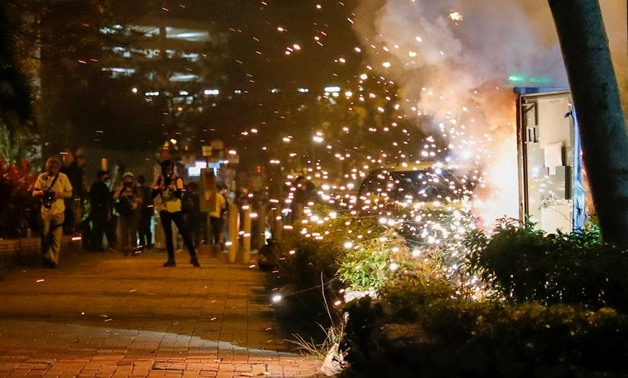
An electricity switch box explodes as it was set on fire by protesters, after Chow Tsz-lok, 22, a university student, died after he fell during a protest, at Tseung Kwan O, Hong Kong, China November 8, 2019. REUTERS/Tyrone Siu
HONG KONG (Reuters) - Hong Kong protesters are planning a 24th straight weekend of pro-democracy rallies, including inside shopping malls across the Chinese-ruled city on Sunday, some of which have started peacefully in recent weeks and descended into violent chaos.
Protesters have also called for a general strike on Monday and for people to block public transport, calls that have come to nothing in the past.
A rally originally planned for Saturday to mark the 30th anniversary of the fall of the Berlin Wall was postponed. A “support martyrs” assembly is expected in the evening, likely focusing on protesters’ demands for universal suffrage for the former British colony.
Police granted permission for the gathering at Tamar park, in front of central government offices, one of the rare approvals for a protest in recent weeks.
Candlelight vigils mourning a student who died after a high fall during a rally in the early hours of Monday quickly spiralled into street fires and clashes between protesters and police on Friday.
Police fired one round of live ammunition to warn what they called “a large group of rioters armed with offensive weapons” who threw bricks at officers trying to clear street barricades in the Kowloon area on Friday night, police said in a statement.
“The lives of the officers were under serious threat,” said the statement, which was released early on Saturday.
The death of the student at a hospital on Friday is likely to fuel anger with the police, who are under pressure over accusations of excessive force as the territory grapples with its worst political crisis in decades.
Chow Tsz-lok, 22, fell from the third to the second floor of a parking lot as protesters were being dispersed by police.
Students and young people have been at the forefront of the hundreds of thousands who have taken to the streets to seek greater democracy, among other demands, and rally against perceived Chinese meddling in the Asian financial hub.
Hong Kong returned to Chinese rule in 1997 under a “one country, two systems” formula, allowing it colonial freedoms not enjoyed on the mainland, including an independent judiciary and the right to protest.
China denies interfering in Hong Kong and has blamed Western countries for stirring up trouble.
Since June, protesters have thrown petrol bombs and vandalised banks, stores and metro stations. Police have fired rubber bullets, tear gas, water cannons and, in some cases, live ammunition.
Last weekend, anti-government protesters crowded a shopping mall in running clashes with police that saw a man slash people with a knife and bite off part of the ear of a politician.

Comments
Leave a Comment